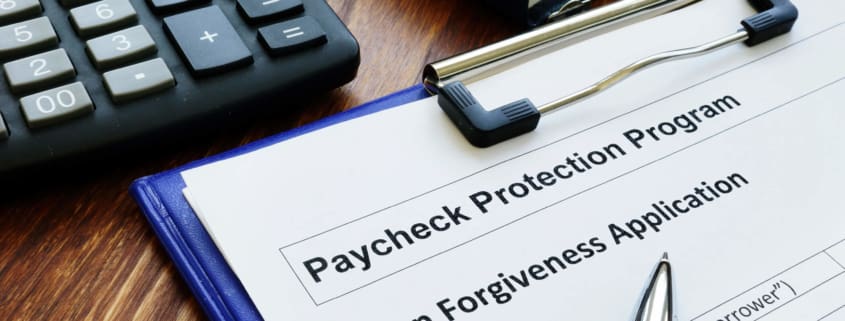SBA PPP Loan Forgiveness Denial: The Ultimate Guide
The Small Business Administration (SBA) has forgiven over 98% of the total Paycheck Protection Program (PPP) loan value that borrowers requested them to forgive; recently, however, SBA has begun to issue more forgiveness PPP loan forgiveness denials.
Many of these recent denials issued by the SBA are not consistent with their own guidelines. Borrowers have received denial letters based on:
- Insufficient communication between SBA and lenders
- Misapplication of SBA’s Interim Final Rules (IFRs) or affiliation rules
- Mistakes by SBA surrounding the loss or misuse of borrower information
Borrowers should be aware that such denials are appealable. Consider challenging forgiveness denials if you believe SBA’s decision is in error.
Read our full guide to SBA’s PPP loan forgiveness denial below to learn more about how to appeal a denial, the criteria required for an appeal, and who can represent your company in the process.
How Do I Know if My Business’ PPP Loan Forgiveness was Denied?
If SBA denied your application, you will receive an SBA Final Decision Letter in the mail.
Learn more about what to do if your PPP loan is not forgiven, here.
How Do I Know Why My Business’ Forgiveness Application was Denied?
The first page of the Final Decision letter contains a section indented and in bold that provides the reasons SBA denied your request for forgiveness. It’s important to understand why SBA is rejecting the forgiveness application before taking action- such as appealing the denial.
Who Makes the Decision on PPP Forgiveness?
The decision to deny your PPP loan forgiveness can be made by:
- Your lender (i.e. bank, credit union)
- The Small Business Administration (SBA)
How Much Time Do I Have to Appeal a PPP Loan Forgiveness Denial?
You must respond to SBA and submit your appeal within 30 days of the date listed on your SBA Final Decision Letter. The timeline for SBA forgiveness appeals is inflexible. Once your initial 30-day period expires, you will lose your right to appeal SBA’s denial to forgive your PPP loan.
How Do I Appeal a PPP Loan Forgiveness Denial?
You must appeal denials of forgiveness to the SBA’s Office of Hearings and Appeals (OHA) within the 30-day period.
File appeals through OHA’s case portal. Filings for PPP appeals received in any other manner may be rejected and not docketed for processing.
SBA states that OHA has jurisdiction over appeals where SBA has provided the borrower with a PPP final loan review decision finding the borrower:
- Is ineligible for a PPP loan
- Is ineligible for the PPP loan amount received
- Used the loan proceeds for unauthorized uses
- Is ineligible for the PPP loan forgiveness amount determined by the lender in its full or partial approval decision issued to SBA, or
- Is ineligible for PPP loan forgiveness when the lender has issued a full denial decision to SBA.
Learn more about how to appeal an SBA PPP forgiveness denial, here.
What Information Do I Need to Provide in the Appeal?
The criteria for an appeal filed with the SBA are strict. According to SBA, appeals must contain:
- A complete, detailed statement as to why the SBA loan review decision is erroneous, with accurate information and legal arguments supporting the statement;
- No more than 20 pages (not including attachments)
- Clearly labeled exhibits and attachments
Due to the strict criteria of the appeal, we recommend hiring a qualified attorney to represent your business and help you to create a strong, successful appeal.
Who Can Represent My Business in the Appeal Process?
An identified legal representative of the business or a qualified attorney must represent the appeal since the SBA PPP loan is a business loan and not a personal loan. To represent your business, one must be:
- A shareholder owner
- An officer, or
- An attorney
Who Can’t Represent My Business in the SBA Appeal Process?
The following positions are not legally entitled or allowed to represent businesses in the SBA appeal process:
- Certified Public Accountants (CPAs)
- Lenders
- General Employees
What if I Lose My Appeal?
Any appeal denied in the Office of Hearings and Appeals will have to go to a higher court. Why? Because SBA is a federal agency. The process of going to federal court can be extremely tedious and expensive due to the strict regulations.
To avoid the costly and time-consuming process of going to the federal district court, we recommend hiring a qualified attorney to make sure you’re building a strong appeal for your business.
While each case is unique and this is not an indication of success in other cases nor a promise of results, our team at Milikowsky Tax Law has extensive experience in government audits and cases involving government entities from IRS to SBA and CSLB.
Contact Milikowsky Tax Law and learn how we can help.



